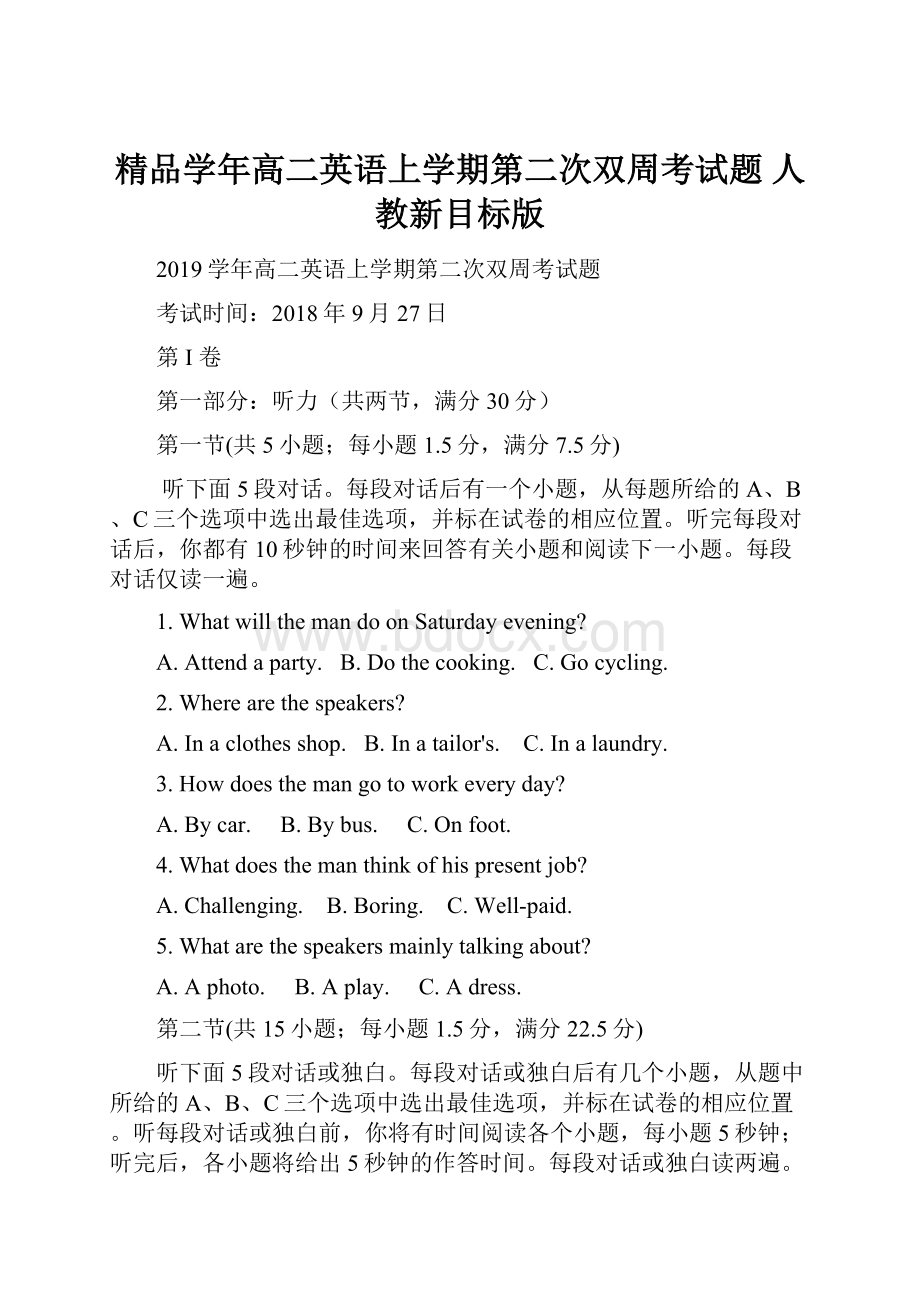精品学年高二英语上学期第二次双周考试题 人教新目标版.docx
《精品学年高二英语上学期第二次双周考试题 人教新目标版.docx》由会员分享,可在线阅读,更多相关《精品学年高二英语上学期第二次双周考试题 人教新目标版.docx(16页珍藏版)》请在冰豆网上搜索。

精品学年高二英语上学期第二次双周考试题人教新目标版
2019学年高二英语上学期第二次双周考试题
考试时间:
2018年9月27日
第I卷
第一部分:
听力(共两节,满分30分)
第一节(共5小题;每小题1.5分,满分7.5分)
听下面5段对话。
每段对话后有一个小题,从每题所给的A、B、C三个选项中选出最佳选项,并标在试卷的相应位置。
听完每段对话后,你都有10秒钟的时间来回答有关小题和阅读下一小题。
每段对话仅读一遍。
1.WhatwillthemandoonSaturdayevening?
A.Attendaparty.B.Dothecooking.C.Gocycling.
2.Wherearethespeakers?
A.Inaclothesshop.B.Inatailor's.C.Inalaundry.
3.Howdoesthemangotoworkeveryday?
A.Bycar.B.Bybus.C.Onfoot.
4.Whatdoesthemanthinkofhispresentjob?
A.Challenging.B.Boring.C.Well-paid.
5.Whatarethespeakersmainlytalkingabout?
A.Aphoto.B.Aplay.C.Adress.
第二节(共15小题;每小题1.5分,满分22.5分)
听下面5段对话或独白。
每段对话或独白后有几个小题,从题中所给的A、B、C三个选项中选出最佳选项,并标在试卷的相应位置。
听每段对话或独白前,你将有时间阅读各个小题,每小题5秒钟;听完后,各小题将给出5秒钟的作答时间。
每段对话或独白读两遍。
听第6段材料,回答第6、7题。
6.Whyisthemanattheairport?
A.Toboardaplane.B.Topickupsomepassengers.C.Tomeetthewoman.
7.Whichflighthasbeendelayed?
A.TheFrenchflight.B.TheSpanishflight.C.TheItalianflight.
听第7段材料,回答第8、9题。
8.Wherecanthemanputhisbag?
A.Behindthedoor.B.Inthelocker.C.Onthedesk.
9.Whatshouldthemandoaftergettingintotheexamhall?
A.Findhisexaminationnumber.
B.Turnoffhismobilephone.
C.ShowhisstudentIDcard.
听第8段材料,回答第10至12题。
10.Whatwillthespeakersdoduringthesummerbreak?
A.Earnsomemoney.B.Enjoysomearts.C.Dosomeshopping.
11.WhatcanthespeakersdoinRosemount?
A.Havesomenicemeals.
B.Findagoodvarietyoflocalartworks.
C.Buysomepaintingsandhandmadejewellery.
12.Wherewillthespeakerssleepduringthesummerbreak?
A.Intheirhouse.B.Inahotel.C.Inatent.
听第9段材料,回答第13至16题。
13.Whatkindofclubdoesthewomanwanttotake?
A.Theonethathasabignumberofmembers.
B.Theonethatoffersmanydifferentactivities.
C.Theonethathasalowentryfee.
14.Whatdoesthemansayaboutthecross-countrycyclingclub?
A.Ithasmanymembers.B.Itlooksquiteinteresting.C.Itistooexpensive.
15.Howmuchdoesthefilmclubcost?
A.$15.B.$30.C.$50.
16.Whichclubwillthewomanprobablyjoin?
A.Thestreetdanceclub.B.Thetabletennisclub.C.Thefilmclub.
听第10段材料,回答第17至20题。
17.Howlongdoesittakethebusestogettothecampingarea?
A.About8hours.B.About6hours.C.About2hours.
18.Whatwillthelistenersdofirstwhentheyarriveatthecampingarea?
A.Goshopping.B.Checkthee-mails.C.Setupthetents.
19.Whatdoesthespeakeradvisethelistenerstodo?
A.Stayinthecampinstormyweather.
B.Listentotheweatherreport.
C.Prepareclothesforwetweather.
20.Whatarethelistenersprobablyunabletodointhehills?
A.AskMrs.Sandersonquestions.
B.Godowntothetown.
C.Usetheirphones.
第二部分:
阅读理解(共20小题;每小题2分,满分40分)
第一节(共15小题;每小题2分,满分30分)
阅读下列短文,从每题所给的四个选项(A.B.C和D)中,选出最佳选项,并在答题卡上将该项涂黑。
A
Wouldyoustopifyousawa6-year-oldgirlaloneinapublicplace?
AsocialexperimentconductedbyUNICEFshowshowdifferentlypeoplereacted—dependingonthegirl’sappearance.
ThevideopostedtoYouTubeonTuesdayfeaturesa6-year-oldchildactornamedAnano.WhenAnanowasdressedinanicedressandcoat,peoplestoppedtoaskifshewaslost,triedtocomfortherandmadephonecallsonherbehalf.
Thenmakeupartistscoveredherfacewithsootanddressedherindirtysweatsandaknitcap.Thevideoshowspeoplewalkingrightpastherwithoutasecondglance.
UNICEFthenrepeatedtheexperimentinsidearestaurant.WhenAnonowascleananddressednicely,dinerswelcomedherattheirtables.Strangerssmiledather,pattedherarmandevenrubbedhercheeks.
Whenshereturnedtotherestaurantinthedirtysweatsandknitcap,peopleclutchedtheirpursesandbagswhenshepassedby.Onemansignaledtoanemployeeandasked,“Canyoutakeheroutplease?
”
ThevideoshowsAnanorunningoutoftherestaurantintears.
“WestoppedtheexperimentbecauseAnanobecametooupset,”UNICEFsaid.
“Theywerealltellingmetogoaway,”UNICEFquotedthelittlegirlassaying.
“Everyday,millionsofchildrenlivinginpovertyareignored,pushedasideanddeprived(剥夺)ofeverythingtheyneedtogrowup,”UNICEFstatedonYouTube.“Itdoesn’tneedtobethisway.Our2016StateoftheWorld’sChildrenReportisacalltoactionfortheworldtotreatitsleastfortunatechildrenthewayittreatsitsluckierchildren.”
21.Fromthevideoweknowthatthelittlegirl’s_________changehowstrangerstreather.
A.wordsB.behaviorC.mannersD.clothes
22.Whywastheexperimentstoppedhalfway?
A.Becausetoomanypeoplestoppedtoaskifthelittlegirlwaslost.
B.Becauseherdirtysweatersandcapneededtobewashed.
C.Becausepeoplewerecoldtothelittlegirlandshewasverysad.
D.Becausenooneeverpaidattentiontoherandboughtherahotdrink.
23.WhatisthepurposeofUNICEF’s2016StateoftheWorld’sChildrenReport?
A.Topersuadetherichpeopletodonatemoneyforthepoorchildren.
B.Toblamepeoplewhoshownomercytoothers.
C.Toasktheclothesfactoriestomakemorebeautifulclothesforchildren.
D.Tocallonpeopletotreattheworst-offchildrenequally.
B
Manypeoplebelievethattheonlywaytomakeourcommunitiessaferistobuildmoreprisons.Butthere’sawaytobetterprotectcitiesandtownsbydoingjusttheopposite.
Inmanycountriesthroughouttheworld,prisonpopulationshaverisensuddenlyoverthepastdecade.Oneofthemainreasonsforthisisthelargenumberofrepeatoffenders;thatispeoplewhobreakthelawagainoncefreedfromjail.Statisticsshowthataboutoneinfourprisonersfreedeveryyearreturntojailwithinthreeyears.
Thisispartlybecauseex-prisonersfacehugedifficultyfindingemployment.Morethanathirdofthemcannotfindanyjobatall.Datashowthathavingajobgreatlyreducesthechancesthatapersonwillcommitacrimeagainorcommitoneinthefirstplace.Releasedprisonerswhodomanagetofindsteadyemploymentare50percentlesslikelytoreturntoprison.Ratherthanharmingacommunity,havingajobhelpsex-prisonerstochangetheirwaysandmakeapositiveandproductivecontributiontotheircommunities.
What’smore,helpingthesemenandwomenfindjobswouldalsosavetaxpayersalotofmoney.Fewprisonerswouldsavegovernmentsmillionsorpossiblyevenbillionsofdollarsannually:
thecostsofbuildingandoperatingjails.
Therearemanythingsthatthegovernmentcandotohelpex-prisonersfindwork.Morejobtrainingprogramsshouldbeintroducedtoprovideprisonerswithworkskillsbeforetheyarefreed.Companiesandfactoriesshouldalsobegiventaxbenefitsiftheyemployex-prisoners.Suchprogramshavebeenshowntoworkinseveralcountries.
Suchpoliciesofcourseassurethatfreedcriminalsactuallywanttowork.Butshouldn’ttheybegiventhechance?
Ourgoal,afterall,shouldn’tbetoincarcerateasmanyprisonersaspossible,buttobuildasocietythatdoesn’tneedtoputsuchalargepercentageofitspopulationinjail.Weshouldtakeastepinthatdirectionandhelpprisonersfindself-respectandpurposethroughwork.
24.Whatpercentageoffreedprisonersreturnstoprisonwithinthreeyears?
A.65%B.50%C.33%D.25%
25.Whichofthefollowingbestdescribesthecontentofthefifthparagraph?
A.FactsB.ArgumentsC.RecommendationsD.Requirements
26.Whatdoestheunderlinedword“incarcerate”inthelastparagraph?
A.setfreeB.lockupC.employD.separate
27.Whichofthefollowingwouldbeauthoragreewith?
A.Tougherpunishmentwillreducecrime
B.Mostprisonersdonotdeservetobeinprison
C.Economicconditionsareamajorcauseofcrime
D.Prisonpopulationsarelikelytoincreaseinthefuture
C
Didyouhearwhathappenedatyesterday’smeeting?
Canyoubelieveit?
Ifyoufindthosesortsofquietlywhisperedquestionsaboutyourco-workersirresistible(无法抗拒的),you’rehardlyalone.Butwhyarewedrawntogossip?
Anewstudysuggestsit’sbecausetherumorsareallaboutus.“Gossipreceiverstendtousepositiveandnegativegroupinformationtoimprove,promote,andprotecttheself,”writesaresearchteam,ledbyElenaMartinescuoftheUniversityofGroningenintheNetherlands.InthejournalPersonalityandSocialPsychologyBulletin,theresearchersdescribedtwoexperimentstestingthepersonalvaluegossipreceiversget.
Thefirstfeatured178universityundergraduates,whohadallpreviouslyworkedonatleastonecourseassignmentwithagroupoffourormorestudents.Participantswereaskedtorecallandwriteashortdescriptionofanincident,inwhichagroupmembersharedwiththemeitherpositiveornegativeinformationaboutanothergroupmember’ssecret.Theythenreportedtheirlevelofagreementwithaseriesofstatements.Someofthesemeasuredtheself-improvementvalueofthegossip(“TheinformationreceivedmademethinkIcanlearnalotfromX”);othersmeasureditsself-promotionvalue(“TheinformationIreceivedmademefeelthatIamdoingwellcomparedtoX”).Stillothersmeasuredwhetherthegossipraisedpersonalconcerns(“TheinformationIreceivedmademefeelthatImustprotectmyimageinthegroup”).
Inthesecondexperiment,122undergraduateswereassignedtheroleof“salesagent”atamajorcompany.Theyreceivedgossipfromacolleaguethatathirdpersoneitherdidverywellorverybadlyataperformanceevaluation,andwerethenaskedabouttheemotionsthatinformationcaused.Theyalsorespondedtotheabove-mentionedsetofstatementspresentedtotheparticipantsinthefirstexperiment.
Ineachexperiment,participantsfoundbothnegativeandpositivegossi